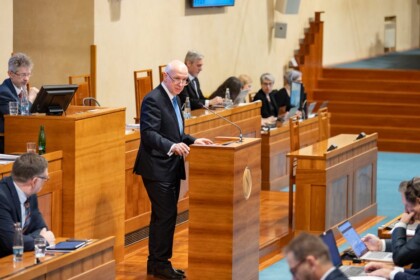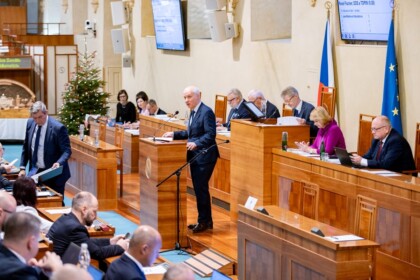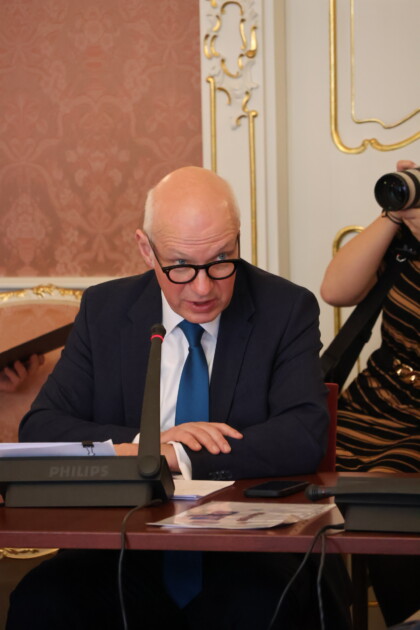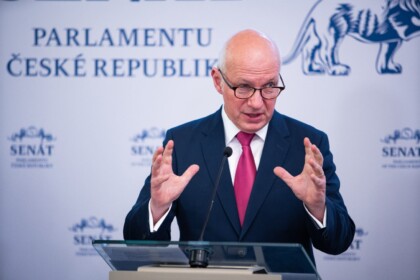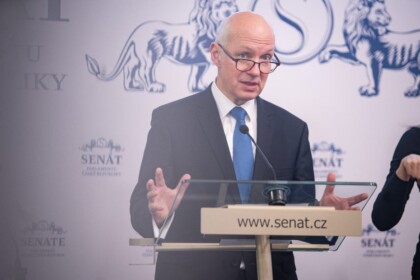Projev na konferenci
Meziparlamentní konference EU o společné zahraniční, bezpečnostní a obranné politice
Projevy|5.9.2022
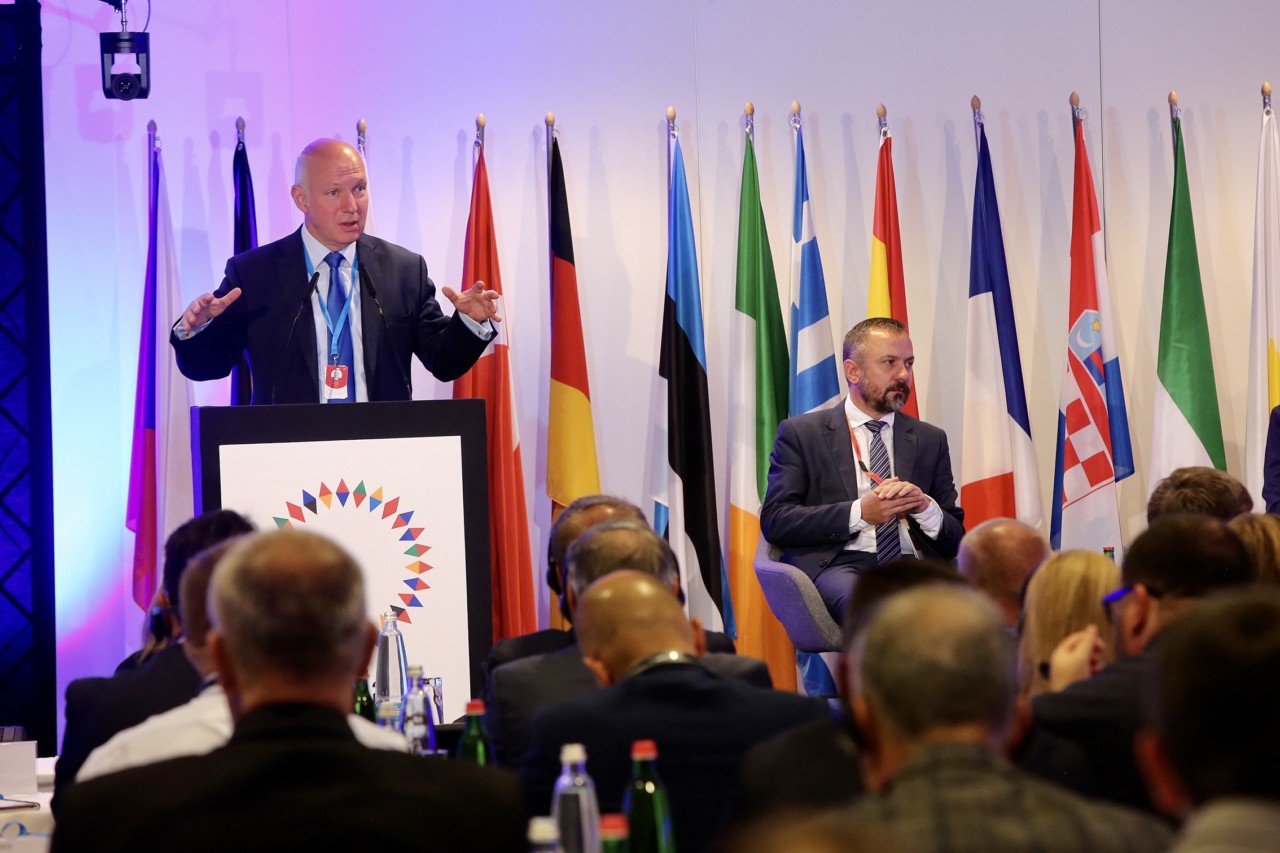
Projev senátora Pavla Fischera na úvod meziparlamentní konference EU o společné zahraniční, bezpečnostní a obranné politice konané v Praze 5. září 2022.
překlad z angličtiny:
Paní předsedkyně,
vážení členové parlamentů,
vážené kolegyně a kolegové,
dámy a pánové,
minulé pondělí, před týdnem, pronesl německý kancléř Olaf Sholz právě zde v Praze zásadní projev o EU, jejích institucích. Hlavně se ale zaměřil na ruskou agresi vůči Ukrajině. O Číně se téměř nezmínil. Dovolte mi, abych s ním při této příležitosti vedl jakýsi dialog na dálku ve svém úvodním projevu.
V červenci jsme měli tu čest hostit v Praze velmi vzácného hosta. Předseda parlamentu Tchaj-wanu navštívil český parlament, my jsme ho požádali, aby vystoupil v senátu. Byla to světová rarita, neboť členové tchajwanského parlamentu příliš necestují.
V jeho slovech zaznělo vážné varování, protože nás vyzval: v zájmu lidstva věnujte mnohem větší pozornost komunistické Číně. Představy, že ji světové demokracie změní k lepšímu jen tím, že s ní budou obchodovat, se nenaplnily. Nyní je nanejvýš důležité, abychom si uvědomili, že svou politiku musíme změnit od základu.
Proč o tom mluvím? Protože nároky imperiální Číny ohrožují nejen bezprostřední region (vidíme konflikty na hranicích s největším demokratickým státem, Indií), ale ohrožují i světové společenství.
Mocnosti jako Čína a Rusko zacházejí s mezinárodním právem podobným způsobem. Tam, kde my hlásáme svobodu pohybu v mezinárodních vodách, Čína a Rusko omezují svobodu mezinárodní dopravy. Ať už je to v Jihočínském moři, v blízkosti Tchaj-wanu, na který Čína uvalila vojenskou blokádu, nebo jak se Rusko chová v Černém a Azovském moři.
Tam, kde považujeme za nedotknutelnou suverenitu národů založenou na principu sebeurčení a mírového řešení konfliktů, hrozí Putinovo Rusko a dnešní Čína použitím brutální síly.
Minulý týden zveřejnila komisařka OSN pro lidská práva dlouho očekávanou zprávu o Číně. V textu se uvádí, že komunistická Čína páchá zločiny proti lidskosti a že situace naléhavě vyžaduje pozornost mezinárodního společenství.
Když si tedy přečtete dnešní společné prohlášení předsednictví EU, zjistíte, že v textu věnujeme velkou pozornost nejen tomu, co se děje v Indopacifiku, ale také, a to především, v našem bezprostředním sousedství, válce na Ukrajině.
To podstatné již řekli moji předřečníci. Dovolte mi tedy, abych na závěr uvedl osobní zkušenost z naší cesty na Ukrajinu před deseti dny. A jsem velmi rád, že mnozí z účastníků této cesty jsou dnes se mnou v této místnosti.
Ukrajina je pod palbou, krvácí, o její existenci jako státu se rozhoduje v tvrdém boji na život a na smrt. A zároveň se ukrajinská politika doslova mobilizuje, aby se postavila na nohy a co nejrychleji splnila podmínky pro vstup do EU. Ukrajina získala status kandidátské země se seznamem úkolů.
Vidím v současnosti obrovské odhodlání, že by je snad mohla splnit ještě letos. Chce být připravena zahájit jednání s EU ještě před koncem roku. Jejich nadšení a motivace jsou neuvěřitelné. Uvědomují si, že rozhodují o svém budoucím osudu a hrají historickou bitvu o směřování své země.
Tato historická bitva se týká i nás, všech členských států EU. Pragmatická řešení zde již nefungují. V tomto konfliktu nemůžeme zůstat neutrální.
Proto, abychom vytvořili podmínky pro pevný konsenzus v rámci EU, potřebujeme, aby se občané mobilizovali. A v tomto úkolu je úloha parlamentů zásadní. Jsme rádi, že k tomu máme příležitost. A pro Českou republiku je ctí, že může v tomto historickém okamžiku hostit toto setkání.
Děkuji vám za pozornost.
originál v angličtině:
Madam Speaker,
Honorable members of Parliaments,
Dear colleagues,
Ladies and gentleman,
Last monday, one week ago, the German chancelor Olaf Sholz deliverd in this very city of Prague a major speech about the EU, its institutions, and mainly focused on the Russian aggresion againts Ukraine. He almost did not mention China. Let me engage a kind of remote dialogue with him in my introductorty remarks at this occasion.
In July we had the honour to host a very special guest in Prague. The Speaker of the Parliament of Taiwan visited the Czech Parliament and we asked him to give a speech in the Senate. It was a world rarity, as members of the Taiwanese Parliament do not travel much.
There was a serious warning in his words. Since he urged us: for the sake of humanity, pay much more attention to Communist China. The notions that the democracies of the world would transform it for the better only by doing business with it have not come true. It is now a matter of the first importance that we realise that we must change our policy from the ground up.
Why am I talking about this? Because the claims of imperial China threaten not only the immediate region, we see conflicts on the borders with the largest democratic state, India, but it also threatens the world community.
Powers such as China and also Russia are treating international law in a similar way. Where we preach freedom of movement in international waters, China and Russia are restricting freedom of international navigation. Whether it is in the South China Sea or in the vicinity of Taiwan, on which China has imposed a military blockade, or how Russia behaves in the Black Sea and the Sea of Azov.
Where we hold as sacred the sovereignty of nations based on the principle of self-determination and peaceful resolution of conflicts, Putin’s Russia and today’s China threaten to use brutal force.
Last week, the UN Commissioner for Human Rights published her long-awaited report on China. The text says that Communist China is committing crimes against humanity and that the situation urgently requires the attention of the international community.
So, when you read the joint EU presidency statement of today, you will see that in the text, we are not only paying close attention to what is happening in the Indo-Pacific, but also, and above all, in our immediate neighbourhood, the war in Ukraine.
My previous speakers have already said the essentials. So let me conclude with a personal experience from our journey to Ukraine ten days ago. And I am very pleased that many of the participants in that trip are with me in this room today.
Ukraine is under fire, it is bleeding, its existence as a state is being decided in a bitter fight to the death. And yet, at the same time, Ukrainian politics is literally mobilising to stand up and fulfil the conditions for EU accession as quickly as possible. Ukraine has been given candidate status with a list of tasks.
Today, I see a huge determination that it could hopefully have them fulfilled this year. It even wants to be ready to open negotiations with the EU before the end of the year. Their passion and motivation are incredible. They are aware that they are deciding their future destiny and are playing a historic battle over the direction of their country.
This historic battle is also ours, of all the member states of teh EU. Pragmatic solutions are no longer working here. We cannot remain neutral in this conflict.
Therefore, in order to create the conditions for a strong consensus within the EU, we need citizens to mobilise. And in this task, the role of parliaments is essential. We are glad to have the opportunity to do so. And it is an honour for the Czech Republic to host this meeting at this historic moment.
Thank you for your attention.
